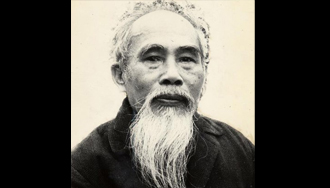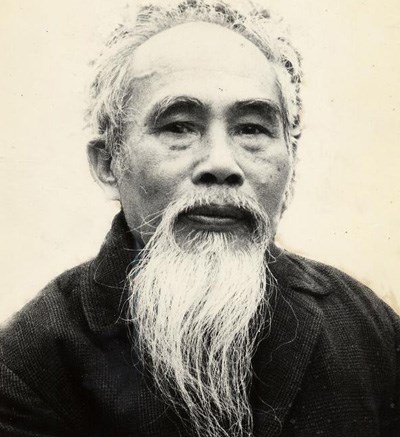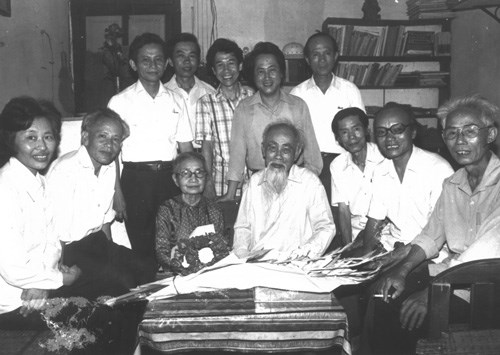

Professor Dao Duy Anh (1904-1988) was one of the professors who contributed to the establishment of the literary foundation.that is the modern social sciences and humanities of the country.
Professor Dao Duy Anh was born on April 25, 1904 in Thanh Hoa and died on April 1, 1988 in Hanoi. The Dao family was originally from Khuc Thuy village, Ta Thanh Oai commune, Thanh Oai district, Ha Dong province (now Hanoi). His grandfather moved to Thanh Hoa (Trung Chinh commune, Nong Cong district). After graduating from Hue National School (1923), he did not want to be a civil servant under the colonial government but chose the noble profession of teaching, teaching at Dong Hoi Primary School (Quang Binh). At that time, the patriotic movement was rising vigorously with the sound of the Sa Dien bomb (Guangzhou, China) by Pham Hong Thai in 1924, the movement to demand "amnesty" for Phan Boi Chau in 1925, Phan Chu Trinh's funeral in 1926, and progressive journalism and publishing activities in big cities, which attracted the mind of the young intellectual Dao Duy Anh. At the end of 1925, he was present at the Quang Tri Dong Hoi meeting to welcome Phan Boi Chau on his way from Hanoi to Hue. In 1926, he resigned from his teaching position, went to Da Nang and intended to go to Saigon to live in cultural and political centers to "escape the stagnant pond", "find a place with high sky and wide sea" to have the conditions to "expand knowledge" and come into contact with patriotic activities. From then on, he devoted himself to political and cultural activities.
On the way to Da Nang, he stopped by Hue to visit Phan Boi Chau who was under house arrest at Pho Quang Pagoda (later moved to a house on Ben Ngu slope), and went to Quang Nam to meet Huynh Thuc Khang who was the President of the Central Vietnam House of Representatives. He helped Huynh found the newspaper.People's voice, held the position of Editorial Secretary. In late summer 1926, he joined the Vietnam Revolutionary Party, later renamed the Tan Viet Revolutionary Party (July 1928) and he became the party's General Secretary. Also in 1928, he foundedQuan Hai Library, with the collaboration of progressive intellectuals such as Vo Liem Son, Tran Dinh Nam, Phan Dang Luu... published popular books to familiarize readers with scientific thought and historical materialism. During its short existence until July 1927, this Publishing House published 13 publications, including the first works of Dao Duy Anh. In July 1929, Dao Duy Anh was arrested by the colonial government and was not released from prison until early 1930.
From then on, he began to focus on cultural and scientific activities. He completed and published two dictionaries: "Chinese - Vietnamese dictionary" (1932), "French - Vietnamese dictionary" (1936). These are not only essential tool books for research, meeting the requirements of cultural and scientific development at that time, but also through words and political concepts, the author intended to include progressive and scientific explanations according to the Marxist perspective and modern ideological trends. Dao Duy Anh is a lexicographer who laid the foundation for modern Vietnamese lexicography.
In the field of culture and literature, he published many works: "Vietnamese cultural history outline" (1938), "Confucian criticism of minor laws" (1938), "Chinese History Outline" (1942), "Essay on Kim Van Kieu" (1943). Work ""Outline of Vietnamese Cultural History"by Dao Duy Anh and his work "Annam civilization" (La Civilization Annamite, 1944) by Nguyen Van Huyen is a scientific work that laid the foundation for the formation of modern Vietnamese cultural studies based on the spirit of science and nationality.

Professor Dao Duy Anh with his students
However, the field of science that Dao Duy Anh devoted the most effort to was History..After the August Revolution in 1945, Professor Dao Duy Anh was invited to teach History at the Hanoi University of Letters, which opened on November 15, 1945, along with other universities and colleges. He was a member of the National Cultural Congress Campaign Committee (1946). During the resistance war against France, he worked in the Literary and Artistic Association of Inter-Zone IV. In 1950, he was invited to Viet Bac to be the Head of the History and Geography Department of the Department of Literature and Art, Ministry of Education. In 1952, he returned to Thanh Hoa to teach at the University Preparatory School. In 1954, after peace was restored, he returned to Hanoi to teach at the University of Education and the University of Letters. In 1956, Hanoi University of Science was established, and he was appointed Head of the Department of Ancient Vietnamese History, taking care of training and scientific research. The time working at the Faculty of History, Hanoi University of Science until 1958, was only more than 2 years. But this was the time when Professor Dao Duy Anh focused all his efforts on the field of History and achieved the highest results.
With the materials accumulated over many years, along with his reflections and some drafts prepared during the years of resistance, now having the conditions to supplement, update information and refer to related foreign scientific works, he has conducted many very basic research topics on Vietnamese history, especially on ancient and medieval history such as the issue of historical divergence, ethnic origin, the issue of slave ownership, feudalism, the formation of the Vietnamese nation... Professor Dao Duy Anh has completed the old draft and published two sets of textbooks: "History of Vietnam" (1956) and "Ancient Vietnamese History" (1956). Soon after, he added and rewrote it as "Ancient History of Vietnam" (1957) consists of 4 volumes. In the years 1957 - 1958, he continued to publish "The formation of the Vietnamese nation" (1957) and rewrite "History of Vietnam from origin to 19th century" (2 volumes, 1958). It is rare to see an expert complete and publish so many scientific works in such a short period of two years. During these two years, Professor Dao Duy Anh also made great efforts to build a long-term database for the History Department and Hanoi University of Science. He sought to purchase valuable Chinese documents, hired people to copy Vietnamese historical books and Han Nom documents, collected foreign sources of documents written about Vietnam, and planned to translate necessary documents for students to refer to. In addition to the Department of Ancient and Medieval Vietnamese History, there was a translation team consisting of senior Sinologists and a Cartography team. Also during these two years, Professor Dao Duy Anh participated in training 3 courses of students from the History Department, Hanoi Pedagogical University and Hanoi University of Science (1954 - 1958), the first generations of historians of the independent Vietnamese university system, many of whom became professors, associate professors and plays an important role in the development of modern history of the country.
In 1958, Professor Dao Duy Anh transferred to the Ministry of Education, then in 1960 transferred to the Institute of History. From here, he stopped teaching at the university and focused on a field suitable for the new working conditions while still continuously contributing to the country's academic foundation. According to the assignment of the Institute of History, he edited and annotated many valuable books that were translated into Vietnamese such as "Chronicle of the Dynasties","Dai Nam Thuc Luc","Miscellaneous Notes on Border Defense", "Complete Annals of Dai Viet","Dai Nam Nhat Thong Chi","The Essentials of Military Strategy and Tiger Camp","Gia Dinh citadel information","Nguyen Trai Complete Works".Also during this time and after his retirement (1965), he compiled a number of works such as "Vietnam through the ages" (1964), "Dictionary of Kieu story" (finished in 1965, published in 1974), "Nom script, origin, structure and development" (1975), translated and annotated "Key to failure" (1974), "Department of" (1974), "Fairy Flower Story" (1978), "Nguyen Du's Chinese Poetry" (1988), "Book of Poetry" (unpublished) "Tao Te Ching and Lao Tzu's Doctrine" (unpublished). At the end of his life, he wrote a memoir"Remember this afternoon"(finished in 1974, published in 1989).
On the long journey from 1928 until his death, Professor Dao Duy Anh left behind a huge legacy with many works in many fields from Dictionaries, Languages, Cultures, Literature to History, Archeology, Texts, Ethnology, Historical Geography. He was an erudite scholar with encyclopedic knowledge of social sciences and humanities, with a tireless scientific work spirit expressing a passion, a great ambition and an extraordinary determination. Above all, he was a great historian, a great culturalist with pioneering research works that laid the foundation for the formation of modern Vietnamese history and cultural studies. In 2000, Professor Dao Duy Anh was posthumously awarded the Ho Chi Minh Prize for two works "Ancient History of Vietnam"and "History of Vietnam from its origin to the 19th century".
Professor Dao Duy Anh was present at the Faculty of Letters since its establishment (1945), then at the University Preparatory School in Thanh Hoa (from 1952) and the Faculty of Letters, Hanoi Pedagogical University and Hanoi University of Science (from 1954 to 1958). He was one of the professors who contributed to the establishment of the Faculty of Letters, that is, the modern social sciences and humanities of the School and of the country.
|
PROFESSOR DAO DUY ANH
+ Working unit: Vietnamese Ancient History Group, later Department of Ancient and Medieval Vietnamese History (Faculty of History). + Management position: Former first Head of the Department of Ancient and Medieval Vietnamese History (Faculty of History).
Chinese - Vietnamese dictionary, Hanoi, 1932. French - Vietnamese dictionary, Hanoi, 1936. Vietnamese cultural history outline,1938. History of Vietnam from origin to late 19th century, Hanoi, 1956. Ancient History of Vietnam,Hanoi, 1957. The problem of forming the Vietnamese nation,Hanoi, 1957. Vietnam through the ages,Hanoi, 1964.
+ Ho Chi Minh Prize for Science and Technology in 2000 for a cluster of Vietnamese historical and cultural works, including 4 books:History of Vietnam from its origin to the end of the 19th century;Ancient History of Vietnam;VVietnamese cultural history outline;Vietnam through the ages. |
Author:Prof. Dr. Phan Huy Le
Newer news
Older news